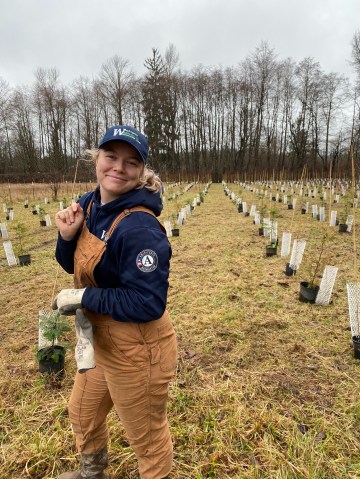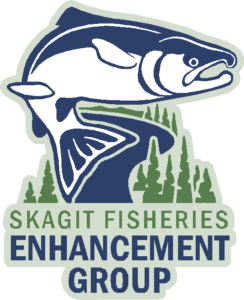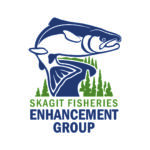Making a Difference, One Plant at a Time.
Written by WCC crew member Emillie Shistle

Seeing the impact six people with brush cutters can have on a piece of land is fantastic. Seeing the impact an enhancement group can have on the ecosystem is even more thrilling. When the Washington Conservation Corps crew showed up at the site in Hamilton, it was somewhat overwhelming. Tall grass was hiding the trees that were planted by an earlier crew, and the rest of the field was a monoculture of grass. Our crew spent a good amount of time whacking the grass down, being careful to mind the trees and plants doing their best to grow. Once we whacked all the grass down we spent some time staking out where the next set of trees and shrubs will be planted. All the stakes needed to be spaced 8’x8’ in order to give them adequate room to grow into mature plants, as well as giving enough room to mow down the grass that is bound to grow back.

Once the trees get taller they will shade out the grass and it will mature into a beautiful, abundant, and native forest, no longer requiring much maintenance. Skagit Fisheries volunteer planting parties, along with our Washington Conservation Corps crew, are going to get 3,500 plants into the ground at this specific site in Hamilton. Volunteers at this site will also be building a trail, putting in a picnic table, and putting in informational signs. These plants will provide habitat for native animals and insects, as well as providing a buffer for the slough that is connected to the Skagit River. This will naturally filter out things we don’t want in our watershed. The plants will aid in water quality and provide more shade for the slough, lowering its temperature to a happy level for salmon. People, plants, and our overall ecosystem will benefit from the hard work we are putting in at the site in Hamilton.
In the short term, turning a grass field into a field of tiny, baby trees might not seem like it’s going to have much of an impact. However, helping the natural cycles break through the suffocating grass and reform a native forest is going to be an impact felt for many decades into our future. It will be a visible and tangible impact for current and future generations. That is the reason we do what we do.





